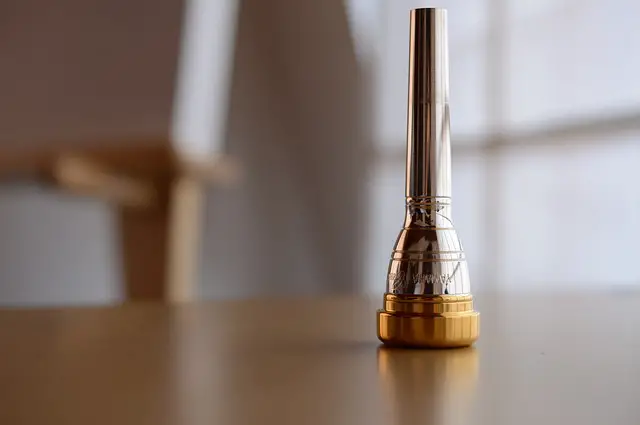A trumpet mouthpiece plays a crucial role in determining the sound quality and range of a trumpet. A well-chosen mouthpiece can make a significant difference in the high notes that a trumpet player can hit. However, with so many different types of mouthpieces available on the market, it can be challenging to determine which one is best for high notes.
When it comes to playing high notes on the trumpet, a mouthpiece with a small and shallow cup is generally recommended. This type of mouthpiece allows for more control and precision in the upper register, making it easier to hit those high notes with clarity and accuracy.
Additionally, a mouthpiece with a smaller throat and backbore can help to increase the speed and agility of a player’s high notes.
In this article, we will explore some of the best trumpet mouthpieces for high notes, taking into account factors such as cup size, throat size, and backbore shape.
Whether you are a professional trumpet player or a beginner looking to improve your high note range, this article will provide valuable insights and recommendations to help you find the perfect mouthpiece for your needs.
Understanding High Notes and Trumpet Mouthpieces
High notes on the trumpet are a crucial aspect of playing, and many trumpet players strive to hit the highest notes possible. However, high notes can be challenging to play, and it takes a lot of practice and the right equipment to achieve them. One of the most important pieces of equipment for playing high notes is the trumpet mouthpiece.
The mouthpiece is the part of the trumpet that the player blows into, and it affects the sound and playability of the instrument. When it comes to playing high notes, the mouthpiece’s shape, size, and depth can make a significant difference.
A mouthpiece that is too shallow or too deep can make it difficult to hit high notes, while a mouthpiece that is too wide can make it challenging to play with accuracy.
One of the most critical factors to consider when choosing a mouthpiece for high notes is the cup size. A smaller cup size can help players hit higher notes, as it requires less air to produce a sound. However, a smaller cup size can also make it more challenging to play with a full sound and tone.
Another essential factor to consider is the rim shape. A sharper rim can help players hit high notes more easily, but it can also cause discomfort and fatigue during extended playing sessions. A rounder rim can be more comfortable to play with but may require more effort to hit high notes.
Overall, finding the right mouthpiece for playing high notes is a personal choice that depends on the player’s skill level, playing style, and personal preferences.
It is essential to try out different mouthpieces and experiment with different sizes and shapes to find the one that works best for you.
Top Trumpet Mouthpieces for High Notes
Yamaha YAC TR11B4
The Yamaha YAC TR11B4 is a popular choice among trumpet players for high notes. It has a shallow cup and a narrow rim that allows for greater flexibility and control in the upper register.
The rim is also rounded, which provides comfort during extended playing sessions. The YAC TR11B4 has a medium-sized throat that provides a bright and focused sound that is ideal for lead playing in jazz and pop music.
Bach 7C
The Bach 7C is a versatile mouthpiece that is suitable for a wide range of playing styles, including high notes. It has a medium cup depth and a medium-wide rim that provides a comfortable playing experience.
The throat is relatively small, which helps to produce a bright and focused sound. The Bach 7C is a popular choice for students and professionals alike due to its versatility and reliability.
Schilke Standard Series 14A4a
The Schilke Standard Series 14A4a is a high-performance mouthpiece that is designed for lead playing in jazz and pop music. It has a shallow cup and a semi-rounded rim that provides a comfortable playing experience. The throat is relatively large, which helps to produce a bright and powerful sound.
The Schilke Standard Series 14A4a is a popular choice among professional trumpet players due to its precision and consistency.
Factors to Consider When Choosing a Mouthpiece
When choosing a mouthpiece for high notes, there are several factors to consider. The following sub-sections will explore the most important aspects to take into account when selecting the right mouthpiece for your needs.
Rim Width
The rim width is an essential factor to consider when choosing a mouthpiece. A wider rim can provide more support for the lips, while a narrower rim can allow for more flexibility and control. It is important to find a rim width that is comfortable for the player and allows for proper lip placement.
Cup Depth
The cup depth of a mouthpiece can also affect the player’s ability to hit high notes. A shallower cup can provide more ease in the upper register, while a deeper cup can provide a richer, fuller sound in the lower register. It is important to find a cup depth that balances the player’s desired tone with their ability to play high notes comfortably.
Throat Size
The throat size of a mouthpiece can impact the player’s ability to produce a clear, focused sound in the upper register. A larger throat can provide more airflow and a brighter tone, while a smaller throat can provide more resistance and a darker tone. It is important to find a throat size that allows for proper airflow and control in the upper register.
How to Play High Notes Effectively
Proper Breathing Technique
Playing high notes on the trumpet requires proper breathing technique. The player must take a deep breath from the diaphragm and not from the chest. This allows for a greater amount of air to be taken in, which is necessary for producing high notes. The player should also exhale slowly and evenly, using a controlled stream of air.
Lip Positioning
The positioning of the lips is crucial for playing high notes. The player should form a tight, firm embouchure by rolling the lips inward and slightly puckering them. This creates a smaller aperture, which allows for greater control over the sound produced. The player should also use the tip of the tongue to guide the air stream and create a more focused sound.
Regular Practice
Playing high notes effectively requires regular practice. The player should start by practicing simple exercises, such as long tones and lip slurs, to build endurance and control.
As the player becomes more comfortable with these exercises, they can gradually increase the range and difficulty of the exercises. It is important to take breaks and rest the lips as needed to avoid fatigue and injury.
By following proper breathing technique, lip positioning, and regular practice, players can develop the skills necessary to play high notes effectively on the trumpet.
Maintaining Your Trumpet Mouthpiece
Maintaining your trumpet mouthpiece is crucial to ensure its longevity and optimal performance. Here are some tips to help you keep your mouthpiece in great condition:
Clean Your Mouthpiece Regularly
It is important to clean your mouthpiece regularly to prevent the buildup of dirt, grime, and bacteria. You can use a mouthpiece brush and warm soapy water to clean the mouthpiece. After cleaning, rinse it thoroughly with warm water and dry it with a soft cloth.
Avoid Harsh Chemicals
Avoid using harsh chemicals or abrasive materials to clean your mouthpiece as they can damage the mouthpiece’s surface and affect its sound quality. Instead, use a mild soap and water solution to clean your mouthpiece.
Store Your Mouthpiece Properly
When not in use, store your mouthpiece in a clean and dry place to prevent it from getting damaged or contaminated. You can use a mouthpiece pouch or case to protect it from scratches and dents.
Inspect Your Mouthpiece Regularly
Inspect your mouthpiece regularly for any signs of damage or wear. If you notice any cracks, chips, or other damage, it is best to replace your mouthpiece to avoid affecting your playing or sound quality.
By following these simple tips, you can ensure that your trumpet mouthpiece stays in great condition and performs optimally for years to come.







